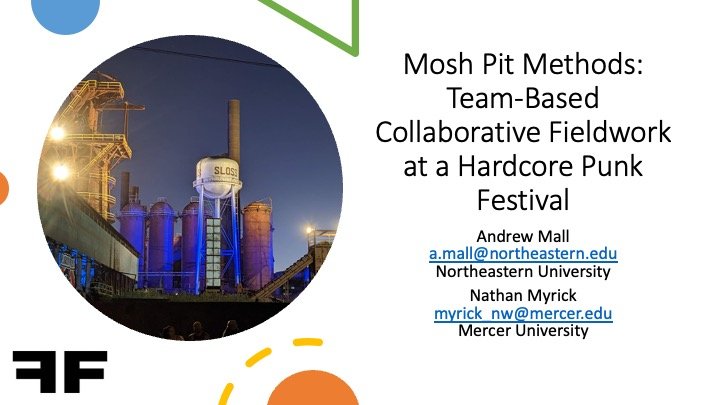
Hardcore Community at Furnace Fest: Nostalgia, Belongingness, and Vulnerability
Punk Scholars Network conference presentation (2025). In this paper I reflect on the meaningfulness of the Furnace Fest community to individual participants. My findings are based on four sequential years of fieldwork at Furnace Fest (2021–24) with ever-growing research teams, hundreds of survey responses, and dozens of hours of semi-structured interviews with organizers, community members, and random attendees (around 50 conducted at the 2024 event alone). I argue that nostalgia at Furnace Fest is generative as much as it is reflective, affirming participants’ identities while also empowering them to take risks and be vulnerably transparent in relative safety.

Hardcore Nostalgia at Furnace Fest
MEIEA conference presentation (2024). What is the nature of hardcore, and how does hardcore nostalgia reflect its values and meet its needs? More than merely a marketing ploy, is hardcore nostalgia also an invitation to revisit and romanticize the anxieties of our youth; an attempt at a do-over; or perhaps even an act of emotional and mental self-care? In this presentation, we trace these trends in hardcore and emo to ask: what do we do with nostalgia that asks us to remember when we were young and angry and sad?

Mosh Pit Methods: Team-based Collaborative Fieldwork at a Hardcore Punk Festival
SEM conference presentation (2023). In this paper, we address the complexities of collaborating at these multiple levels: with each other, research assistants, festival organizers and staff, community leaders and members, and festival attendees. In attending to these challenges and opportunities, we open a conversation about the power and potential of team-based, collaborative fieldwork.

Review of Anthology of Emo (2 vols.) and Washed Up Emo (podcast)
Punk & Post-Punk (2021). In this review of Tom Mullen's Anthology of Emo (2 vols.) and Washed Up Emo (podcast), I explain how Mullen has contributed to a long trajectory of emo’s and reputational recovery. He is key to emo nostalgia in the 2010s and its resurgence and flourishing into the 2020s.

Emo
The SAGE International Encyclopedia of Music and Culture, SAGE Publications (2019). Emo, short for “emocore” or “emotional hardcore,” refers both to a genre of rock music and to its subculture. The genre first emerged from punk rock and hardcore punk in the mid-1980s in local underground music scenes, most notably that of Washington, D.C. Throughout the 1990s, it gradually spread across the trans-local networks of underground music scenes in North America. In the early 2000s, several emo bands and the genre itself achieved mainstream success. Like punk rock and other subcultures in previous decades, emo became a popular trend and commodity at its commercial peak, especially among teenagers and young fans.
Search and navigate extras
- music industries
- festivals
- gamelan
- Boston
- God Rock Inc
- CCM
- Northeastern University
- Christian rock
- panels
- Tufts University
- worship
- congregational music
- Northeastern Global News
- SCM
- record labels
- Nashville
- methods
- ethics
- Chicago
- University of Chicago
- punk
- SEM
- radio
- Taylor Swift
- subculture
- capital
- Furnace Fest
- AMS
- TikTok
- IASPM-US
- hardcore
- sing-alongs
- Amy Grant
- crossover
- introductions
- emo
- vinyl
- TIME
- scene
- AAR
- Beer & Hymns
- MEIEA
- Christianity Today
- DePaul University
- Universal Music Group
- awards
- Future of Pop
- community
- Keith Green
- Ticketmaster